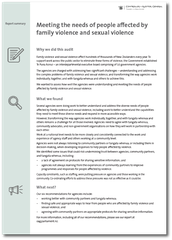Summary of our report
 Why we did this audit
Why we did this audit
Family violence and sexual violence affect hundreds of thousands of New Zealanders every year. To support work across the public sector to eliminate these forms of violence, the Government established Te Puna Aonui – an interdepartmental executive board comprising of 10 government agencies.
The agencies are charged with addressing two significant challenges – understanding and addressing the complex problems of family violence and sexual violence, and transforming the way agencies work individually, together, and with tangata whenua and others to achieve this.
We wanted to assess how well the agencies were understanding and meeting the needs of people affected by family violence and sexual violence.
What we found
Several agencies were doing work to better understand and address the diverse needs of people affected by family violence and sexual violence, including work to better understand the capabilities they need to meet these diverse needs and respond in more accessible ways.
However, transforming the way agencies work individually, together, and with tangata whenua and others remains a challenge for all those involved. Agencies need to agree with tangata whenua, community advocates, and non-government organisations on how they will work in partnership with each other.
Work at a national level needs to be more closely and consistently connected to the work and experience of agency staff and others working at a community level.
Agencies were not always listening to community partners or tangata whenua, or including them in decision-making, when developing responses to help people affected by violence.
We identified some issues that could risk undermining trust between agencies, community partners, and tangata whenua, including:
- a lack of agreement on protocols for sharing sensitive information; and
- agencies not always learning from the experiences of community partners to improve programmes and responses for people affected by violence.
Capacity constraints, such as staffing, were putting pressure on agencies and those working in the community. Co-ordinating efforts to address these pressures was not as effective as it could be.
What next?
Our six recommendations for agencies include:
- working better with community partners and tangata whenua;
- finding safe and appropriate ways to hear from people who are affected by family violence and sexual violence; and
- agreeing with community partners on appropriate protocols for sharing sensitive information.
For more information, including all of our recommendations, please see our report.

